Ana Nzinga ap world history stands as a testament to the resilience and strategic brilliance of one of Africa’s most influential rulers. From her childhood to her reign as Queen of Ndongo and Matamba, Nzinga’s life was marked by extraordinary leadership, military prowess, and diplomatic finesse.
As we delve into the annals of history, we will explore the complexities of Nzinga’s character, her impact on the African continent, and her enduring legacy as a symbol of resistance against colonialism.
Ana Nzinga’s Early Life and Reign
Born into the royal family of Ndongo, Ana Nzinga experienced a privileged upbringing. Her father, King Ngola Kiluanji, instilled in her a strong sense of leadership and diplomacy. As a young princess, Nzinga witnessed the political turmoil and Portuguese encroachment that plagued her kingdom.
In 1624, after the death of her brother, Nzinga ascended to the throne of Ndongo. She inherited a kingdom weakened by war and internal strife. Determined to protect her people, Nzinga adopted a shrewd and strategic leadership style.
Early Influences
- Raised in a royal family, Nzinga learned the art of diplomacy and statecraft from her father.
- Her experiences as a princess exposed her to the political complexities and challenges facing her kingdom.
- Nzinga’s strong sense of independence and determination shaped her leadership style.
Leadership Style
Nzinga was known for her cunning and diplomatic skills. She formed alliances with neighboring kingdoms and sought support from the Dutch to counter Portuguese aggression. She also employed guerrilla warfare tactics, using her knowledge of the local terrain to outmaneuver her enemies.
Strategies
- Forged alliances with neighboring kingdoms to strengthen Ndongo’s position.
- Sought support from the Dutch to counter Portuguese influence.
- Employed guerrilla warfare tactics to exploit her kingdom’s geographical advantages.
Ana Nzinga’s Military Campaigns

Ana Nzinga led a series of military campaigns against the Portuguese in the 17th century, proving herself a skilled and formidable military strategist. Her tactics and prowess had a significant impact on the region.
Guerrilla Warfare Tactics
- Nzinga employed guerrilla warfare tactics, using her knowledge of the terrain to launch surprise attacks and ambushes.
- She established a network of spies and informants to gather intelligence on Portuguese movements.
- Her forces were highly mobile, able to strike quickly and then disappear into the surrounding forests.
Diplomatic Strategies, Ana nzinga ap world history
Nzinga also employed diplomatic strategies to her advantage.
- She formed alliances with other African kingdoms, gaining support and resources.
- She used negotiations and treaties to delay Portuguese advances and buy time for her forces to regroup.
Impact of Military Prowess
Ana Nzinga’s military campaigns had a profound impact on the region:
- She prevented the Portuguese from gaining complete control over Ndongo and Matamba.
- Her resistance inspired other African kingdoms to challenge European colonial powers.
- She became a symbol of African resistance and independence.
Ana Nzinga’s Diplomacy and Negotiations

Ana Nzinga was a skilled diplomat who used her knowledge of European politics to protect her kingdoms. She negotiated with the Portuguese and other European powers to secure alliances, trade agreements, and military support.
Negotiations with the Portuguese
Nzinga’s most important diplomatic relationship was with the Portuguese. She negotiated a series of treaties with the Portuguese that allowed her to maintain control of her kingdoms and to trade with them on favorable terms. Nzinga also used her relationship with the Portuguese to gain access to European weapons and technology.
Challenges in Negotiating with Europeans
Nzinga faced a number of challenges in negotiating with Europeans. The Europeans were often unwilling to recognize her as a legitimate ruler, and they often tried to impose their own terms on her. Nzinga had to be careful not to give up too much in her negotiations, and she had to be willing to walk away from a deal if she did not get what she wanted.Despite
the challenges, Nzinga was able to use diplomacy to protect her kingdoms and to secure their independence. She was a skilled negotiator who was able to outwit her European opponents.
Ana Nzinga’s Legacy and Impact

Ana Nzinga’s legacy is immense, extending far beyond her lifetime and the borders of Angola. She is remembered as a fearless warrior, a skilled diplomat, and a tireless advocate for her people’s freedom.
As a Symbol of Resistance Against Colonialism
Ana Nzinga became a powerful symbol of resistance against European colonialism in Africa. Her unwavering determination to defend her kingdom against Portuguese encroachment inspired other African leaders and instilled a sense of hope in the hearts of oppressed peoples across the continent.
Ana Nzinga’s Influence on Religion and Culture

Ana Nzinga’s beliefs and leadership style were influenced by both Christian and traditional African traditions. She blended these elements to create a unique religious and cultural identity for her kingdoms.
Religious Beliefs and Practices
- Nzinga converted to Christianity in 1622 but later reverted to traditional African beliefs.
- She incorporated Christian elements into her traditional ceremonies, such as using a cross as a symbol of power.
- Nzinga believed in the power of ancestors and consulted with them for guidance.
- She also practiced divination and other traditional African spiritual practices.
Incorporation of Traditional African Beliefs into Leadership
- Nzinga used traditional African symbols and rituals to legitimize her rule.
- She wore a leopard skin cloak, a symbol of power and authority.
- Nzinga also used traditional African military tactics and strategies.
- Her leadership style was based on consensus and consultation, reflecting traditional African principles.
Cultural Impact of Her Reign
Nzinga’s reign had a profound cultural impact on Ndongo and Matamba.
- She promoted education and literacy, establishing schools and encouraging the study of history and culture.
- Nzinga also encouraged the development of the arts, including music, dance, and sculpture.
- Her reign marked a period of cultural revival and renewal for both kingdoms.
Ana Nzinga’s Role in the Transatlantic Slave Trade: Ana Nzinga Ap World History

Ana Nzinga’s involvement in the transatlantic slave trade was complex and multifaceted. She was a shrewd and pragmatic ruler who navigated the treacherous political landscape of her time, often making difficult choices to protect her people and her kingdom.
Motivations and Actions
Nzinga’s primary motivation for participating in the slave trade was to gain access to firearms and other European goods. She recognized that the slave trade was a lucrative business, and she used her control over the slave trade to acquire the resources she needed to defend her kingdom against Portuguese aggression.Nzinga
also used the slave trade to maintain her political power. By controlling the flow of slaves, she could reward her allies and punish her enemies. She also used the slave trade to create a network of alliances with other African rulers, which helped her to resist Portuguese expansion.
Impact on the Region
Nzinga’s involvement in the slave trade had a significant impact on the region. The slave trade brought wealth and power to her kingdom, but it also led to the displacement and enslavement of countless Africans. Nzinga’s actions contributed to the depopulation of the region and the disruption of traditional African societies.
Ethical Implications
Nzinga’s role in the slave trade has been the subject of much debate. Some historians have argued that she was a ruthless and opportunistic ruler who profited from the suffering of her people. Others have argued that she was a pragmatic leader who made difficult choices to protect her kingdom.Ultimately,
Ana Nzinga, a renowned figure in AP World History, played a significant role in the Kingdom of Ndongo and Matamba. Her leadership skills and resistance against Portuguese colonialism are widely studied. Interestingly, the average distance covered by a flight is around 460 miles, as mentioned here . Returning to Ana Nzinga’s legacy, her influence and impact continue to be examined in AP World History courses, highlighting her importance in African and global history.
the ethical implications of Nzinga’s role in the slave trade are complex and multifaceted. She was a product of her time and place, and her actions must be understood within the context of the political and economic realities of the 17th century.
Ana Nzinga in Popular Culture

Ana Nzinga has become an iconic figure in popular culture, with her story and legacy inspiring numerous works of literature, film, and other media. These portrayals have contributed significantly to her public perception, shaping how she is remembered and understood today.
Literature
In literature, Ana Nzinga has been featured in various historical novels and plays. One notable example is “The Queen of Angola” by Carolina Maria de Jesus, which portrays her as a courageous and resourceful leader who fought for the independence of her people.
Another significant work is “Nzinga of Angola: Africa’s Warrior Queen” by Linda Heywood, which provides a comprehensive historical account of her life and reign.
Film and Television
Ana Nzinga’s story has also been adapted for film and television. In the 1992 film “The Queen of Angola,” she is depicted as a powerful and determined ruler who confronts Portuguese colonialism. The 2013 television series “Njinga, Rainha de Angola” offers a more nuanced portrayal, exploring her complex relationships with her advisors and rivals.
Other Media
Beyond literature and film, Ana Nzinga’s legacy has been celebrated in other forms of media, including music, art, and dance. In music, she has been the subject of songs by artists such as Miriam Makeba and Lauryn Hill. Her image has also been featured in paintings and sculptures, while her story has inspired choreographers to create ballets and dance performances.
Impact on Public Perception
These portrayals of Ana Nzinga in popular culture have had a profound impact on her public perception. They have contributed to her recognition as a symbol of resistance against colonialism and a pioneer for women’s leadership. Her story has resonated with audiences around the world, inspiring admiration and respect for her courage, determination, and diplomatic skills.
Helpful Answers
What was Ana Nzinga’s childhood like?
Nzinga’s childhood was marked by political intrigue and familial strife. She was born into a royal family and witnessed firsthand the challenges of ruling in a tumultuous era.
How did Ana Nzinga become Queen of Ndongo and Matamba?
Nzinga ascended to the throne after the death of her brother, King Ngola Mbandi. She faced opposition from within her own family and from the Portuguese, who were seeking to expand their influence in the region.
What were Ana Nzinga’s military tactics?
Nzinga was a skilled military strategist who employed guerrilla warfare tactics to resist Portuguese incursions. She formed alliances with neighboring kingdoms and used her knowledge of the terrain to her advantage.
How did Ana Nzinga use diplomacy to protect her kingdoms?
Nzinga was a skilled diplomat who negotiated with the Portuguese and other European powers to protect her kingdoms. She used a combination of threats and concessions to secure favorable terms.
What is Ana Nzinga’s legacy?
Ana Nzinga is remembered as one of the most important figures in African history. She is celebrated for her resistance against colonialism, her diplomatic skills, and her unwavering determination.